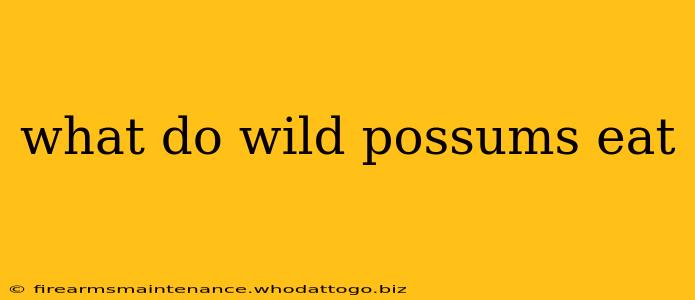Possums, those often-misunderstood marsupials, are fascinating creatures with a surprisingly diverse diet. Understanding what wild possums eat is key to appreciating their ecological role and ensuring their well-being. This comprehensive guide delves into the specifics of their omnivorous diet, exploring regional variations and seasonal changes in their food sources.
The Omnivorous Nature of the Possum Diet
Wild possums are opportunistic omnivores, meaning they'll eat almost anything they can find. Their diet is remarkably adaptable, varying depending on factors like their location, the season, and the availability of food. This adaptability is a key factor in their survival.
Fruits and Vegetables: A Sweet Treat
A significant portion of a possum's diet consists of fruits and vegetables. They're particularly fond of:
- Berries: Blackberries, raspberries, blueberries, and other soft berries are readily consumed.
- Stone fruits: Peaches, plums, and cherries are attractive, especially when ripe and fallen.
- Other fruits: Apples, pears, figs, and melons are also enjoyed when available.
- Vegetables: Possums will happily munch on fallen vegetables from gardens or farms, including tomatoes, corn, and various leafy greens.
Insects: A Crucial Protein Source
Insects form a critical component of a possum's diet, providing essential protein. They are voracious insect eaters, consuming a wide variety of species, including:
- Beetles: Both larvae and adult beetles are readily consumed.
- Moths and Butterflies: These provide a readily available source of protein, especially during the warmer months.
- Grasshoppers and Crickets: These are easy targets, especially in grassy areas.
- Ants and Termites: These social insects, often found in large numbers, are a valuable food source.
Other Animal Matter: Opportunistic Predators
Beyond insects, possums are also opportunistic predators, consuming a range of small animals when the opportunity arises:
- Small rodents: Mice, voles, and other small mammals are sometimes preyed upon.
- Eggs: Birds' eggs are a sought-after delicacy when accessible.
- Carrion: Possums are scavengers and will readily consume dead animals, helping to maintain ecological balance.
Seasonal Variations in Possum Diets
The diet of a possum can fluctuate significantly depending on the season. During the warmer months, fruits and insects are more abundant, providing the bulk of their sustenance. In winter, when food becomes scarcer, they might rely more heavily on scavenging and consuming stored body fat.
Regional Differences in Food Sources
The specific foods consumed by possums also vary by geographic location. For instance, possums living in forested areas might have a higher proportion of fruits and insects in their diet, while those in more urban or suburban environments may rely more on human-provided food sources (though this is generally discouraged).
Understanding Possums' Role in the Ecosystem
The diverse diet of wild possums makes them an important part of their environment. As both predators and scavengers, they play a significant role in controlling insect populations and cleaning up organic matter. Understanding their dietary habits helps us appreciate their ecological importance and work towards their conservation.
This information provides a comprehensive overview of the wild possum's diet, helping to address the query, "What do wild possums eat?" while also shedding light on their ecological role. Further research into specific possum species and their geographical locations can provide even more detailed information.

